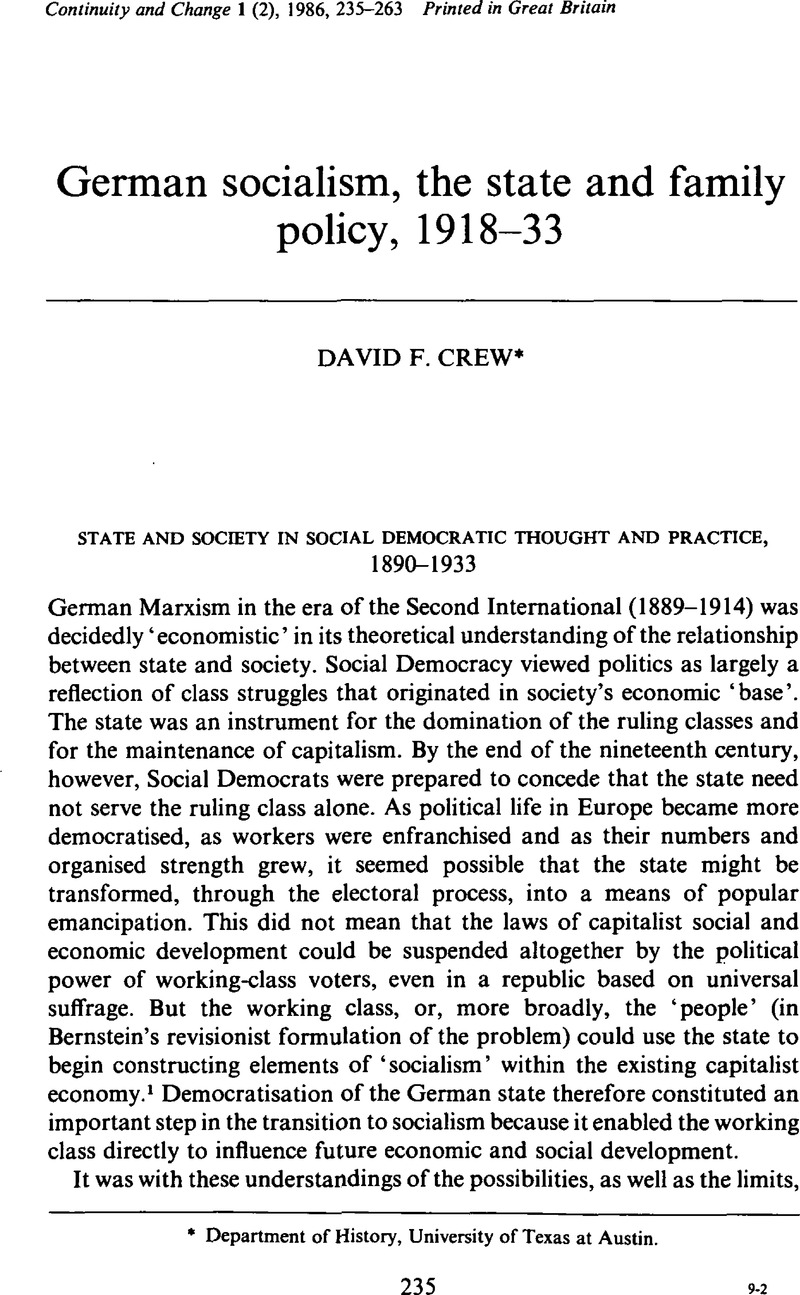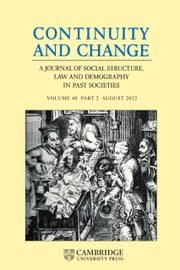Article contents
German socialism, the state and family policy, 1918–33
Published online by Cambridge University Press: 11 November 2008
Abstract

- Type
- Articles
- Information
- Copyright
- Copyright © Cambridge University Press 1986
References
ENDNOTES
I would like to thank the following people for their constructive criticisms of earlier versions of this article: Jane Caplan, Dieter Dowe, Geoff Eley, Joanna Innes, Sara Pietsch, Larry Poos and Richard Wall. Thanks should also be given to Professor Hans Mommsen, Ian Kershaw, Bernd Weisbrod, Christian Parow-Souchon and the archivists at the Stadtarchiv Düsseldorf for their help and support in the winter of 1983 and the summer of 1985. The research for this article was conducted with the help of a British Academy Research Grant (1983) and a University of Texas Summer Research Assignment (1985).
1 See Lucio, Coletti, ‘Bernstein and the Marxism of the Second International’, in Coletti, , From Rousseau to Lenin: Studies in ideology and society (London, NLB, 1972), 45–108Google Scholar and Barry, Hindess, Parliamentary democracy and socialist politics (London, Routledge & Kegan Paul, 1983).Google Scholar
2 Barrington, Moore, Injustice: The social bases of obedience and revolt (White Plains, N.Y., M. E. Sharpe, 1978)Google Scholar; Brian, Peterson, ‘Workers' councils in Germany, 1918–19’, New German Critique 4 (Winter, 1975), 113–24Google Scholar; Rürup, R., ‘Problems of the German Revolution’, Journal of Contemporary History 1968, 109–26.CrossRefGoogle Scholar
3 Gerald, Feldman, Eberhard, Kolb, Reinhard, Rürup ‘Die Massenbewegungen der Arbeiterschaft in Deutschland am Ende des Ersten Weltkrieges (1917–1920)’ Politische Vierteljahresschrift, 13 Jg., Heft 1 (08, 1972), 84–105Google Scholar; Karl-Heinz, Roth, Die ‘andere’ Arbeiterbewegung (München, Trikont Verlag, 1976)Google Scholar; Feldman, Gerald D./Irmgard, Steinisch, ‘Die Weimarer Republik zwischen Sozial- und Wirtschaftsstaat. Die Entscheidung gegen den Achtstundentag’, Archiv für Sozialgeschichle 18 (1978), 353–439Google Scholar; Otto, Kahn-Freund, Labour law and politics in the Weimar Republic (Oxford, Basil Blackwell, 1981)Google Scholar; Uta, Stolle, Arbeiterpolitik im Betrieb (Frankfurt, Campus, 1980).Google Scholar
4 Ludwig, Preller, Sozialpolitik in der Weimarer Republik (Stuttgart, 1949)Google Scholar; Hans, Mommsen, Dieter, Petzina, Bernd, Weisbrod (Hrsg.), Industrielleg system und politische Entwicklung in der Weimarer Republik (Düsseldorf, 1977)Google Scholar. More recently see, however, Heidrun, Homburg, ‘Vom Arbeitslosen zum Zwangsarbeiter: Arbeitslosenpolitik und Fraktionierung der Arbeiterschaft in Deutschland 1930–1933 am Beispiel der wohl-fahrtsenverbslosen und der kommunalen Wohlfahrtshilfe’, Archiv für Sozialgeschichle 25 (1985), 251–98Google Scholar, and Mommsen, W. J. and Wolfgang, Mock (Hrsg.), Die Entstehung des Wohlfahrtsstaates in Grossbritannien und Deutschland (Stuttgart, 1982).Google Scholar
5 Florian, Tennstedt, Vom Proleten zum fndustriearbeiter: Arbeiterbewegung und Sozialpolitik in Deutschland 1800 bis 1914 (Köln, Bund Verlag, 1983), 580.Google Scholar
6 Ibid., 580–1.
7 See Losseff-Tillmans, G. (Hrsg.), Frau und Gewerkschaft (Frankfurt am Main, Fischer, 1982)Google Scholar, and Angelika, Vorholz, Sozialdemokratie und Frauen 1908–1914 in Düsseldorf (Reinbek, Einhorn Presse Verlag, 1982).Google Scholar
8 See Evans, R. J., ‘Politics and the family: Social democracy and the working-class family in theory and practice before 1914’, in Evans, R. J. and Lee, W. R., eds., The German family (London, Croom Helm, 1981)Google Scholar; Silvia, Kontos, Die Partei kämpft wie ein Mann.Frauenpolitik der KPD in der Weimarer Republik (Frankfurt am Main, Roter Stern, 1979)Google Scholar; Losseff-Tillmanns (Hrsg.), ibid.
9 The socialist women's conference at Mannheim in 1906, for example, demanded more ‘protection’ and material aid for pregnant women and nursing mothers. Working-class women were to be educated in the proper care of infants through courses taught at the compulsory continuation schools in the municipalities. Illegitimate children, whose infant mortality rate was particularly high, were to receive special attention. See Dokumente der revolutiondren deutschen Arbeiterbewegung zur Frauenfrage 1848–1974: Auswahl (Leipzig, Verlag für die Frau, 1975)Google Scholar, and Tennstedt, op. cit., 558f.
10 Alfred, Grotjahn, ‘Proletariat und Geburtenrückgang’, Die Neue Zeit 41 Jg., 2 Bd., 1923, 164–72.Google Scholar
11 See Derek, Linton, ‘Imperializing’ laboring youth: The transformation of the socialization framework in Germany, 1871–1918 (Princeton Ph.D. dissertation in history, 1983)Google Scholar and Jürgen, Reulecke, ‘Bürgerliche Sozialreformer und Arbeiterjugend im Kaiserreich’, Archiv für Sozialgeschichte 22, 1982, 299–329.Google Scholar
12 Dr Johann, Caspari, ‘Jugendwohlfahrt’, Die Neue Zeit 37 Jg., 2 Bd., 1918–1919, 570–4Google Scholar. See also Eve Rosenhaft, ‘A world upside-down. Delinquency, family and work in the lives of German working-class youth 1914–1918’, MS August 1983.
13 Rudolf, Wissell, ‘Jugendfürsorge’, Die Neue Zeit 37 Jg., 1 Bd., 1918–1919, 206–10.Google Scholar
14 Die Neue Zeit, 1921–1922, 87.Google Scholar
15 Berger, Dr Heinrich, ‘Wohlfahrtsämter’, Die Neue Zeit 37 Jg., 2 Bd., 1918–1919, 69.Google Scholar
16 Ibid., 66.
17 Ibid., 66.
18 Ibid., 69.
19 Hedwig, Wachenheim, ‘Ausbildung zur Wohlfahrtspflege’, Die Neue Zeit 39 Jg., 2 Bd., 1921, 303.Google Scholar
20 Evans, R. J., ‘Politics and the family: Social democracy and the working-class family in theory and practice before 1914’, in Evans, R. J. and Lee, W. R., eds., The German family (London, Groom Helm, 1981)Google Scholar, and Angelika, Vorholz, Sozialdemokratie und Frauen 1908–1914 in Düsseldorf (Reinbek, Einhorn Presse Verlag, 1982).Google Scholar
21 Volksblatt-ftochum, 3 February 1919.
22 August, Bebel, Die Frau und der Sozialismus (Stuttgart, J. H. W. Dietz, 1910), 469–70Google Scholar. See also Günther, Uhlig, ‘Zur Geschichte des Einküchenhauses’, in Lutz, Niethammer (Hrsg.), Wohnen im Wandel: Beiträge zur Geschichte des Alltags in der burgerlichen Gesellschaft (Wuppertal, Peter Hammer Verlag, 1979)Google Scholar, and also my unpublished MS, ‘Socialism and social reproduction: Family policy in the First World War and Weimar’, 10 1985, 25–41.Google Scholar
23 See, for example, Adelheid von, Saldern, ‘Sozialdemokratie und kommunale Woh-nungsbaupolitik in den 20er Jahren – am Beispiel von Hamburg und Wien’, Archiv für Sozialgeschichte (1985), 208–23, 225–34.Google Scholar
24 See my unpublished MS, ‘Socialism and social reproduction: Family policy in the First World War and Weimar’, October 1985, 32, and Uhlig, Ibid., 164.
25 Mary, Nolan, Social democracy and society: Working-class radicalism in Düsseldorf, 1890–1920 (Cambridge University Press, 1981)Google Scholar; Angelika, Vorholz, Sozialdemokratie und Frauen 1908–1914 in Düsseldorf (Reinbek, Einhorn Presse Verlag, 1982)Google Scholar; Detlef, Josczok, Die Entwicklung der sozialistischen Arbeiterbewegung in Düsseldorf während des 1. Weltkrieges (Reinbek, Einhorn Presse Verlag, 1980)Google Scholar. See also Matull, W., Der Freiheit eine Gasse: Geschichte der Düsseldorfer Arbeiterbewegung (Bonn, 1980).Google Scholar
26 For a detailed discussion of these issues see my unpublished MS, ‘Socialism and social reproduction: Family policy in the First World War and Weimar’. 10 1985, 42–9.Google Scholar
27 For a discussion of the SPD and municipal government during the Weimar period see Georg, Fülberth, Konzeption und Praxis sozialdemokratischer Kommunalpolitik 1918–1933. Ein Anfang (Marburg, 1984)Google Scholar, and Dieter, Rebentisch, ‘Die deutsche Sozial-demokratie und die kommunale Selbstverwaltung. Ein Überblick über Programmdis-kussion und Organisationsproblematik 1890–1975’, Archiv für Sozialgeschichte 25 (1985), 1–78Google Scholar. See also Adelheid von, Saldern, ‘Die Oemeinde in Theorie und Praxis der deutschen Arbeiterorganisationen 1863–1920: Ein Überblick’, International wissen-schaftliche Korrespondenz zur Geschichte der deutschen Arbeiterbewegung 12 Jg., 09 1976, Heft 3, 295–352Google Scholar, and Adelheid von, Saldern, Vom Einwohner zum Burger: Zur Emanzipation der städtischen Unterschicht Göttingens 1890–1920: Eine sozial- und kommunalhistorische Untersuchung (Berlin, Duncker & Humblot, 1973)Google Scholar. On Frankfurt see James, Wickham, ‘Working-class movement and working-class life: Frankfurt am Main during the Weimar Republic’, Social History 8, no. 3, 10 1983, 315–43.Google Scholar
28 See Lutz, Niethammer, ‘Ein langer Marsch durch die Institutionen. Zur Vorgeschichte des preussischen Wohnungsgesetzes von 1918’ in Lutz, Niethammer (Hrsg.), Wohnen im Wandel. Beiträge zur Geschichte des Alltags in der bürgerlichen Gesellschaft (Wuppertal, Peter Hammer Verlag, 1979), 363–84.Google Scholar
29 See Dr Jur. Adalbert, Oehler, Düsseldorf im Weltkrieg. Schicksal und Arbeit einer deutschen Grossstadt (Düsseldorf, Lintz, 1927).Google Scholar
30 Stadtarchiv Düsseldorf (hereafter, StADü), III, 4059, 19 07 1921.Google Scholar
31 StADü, III, 4059, 18 04 1923.Google Scholar
32 StADü, III, 4059, 22 12 1925.Google Scholar
33 StADü, III, 4060, 1930.
34 StADü, III, 4059, 08 1919.
35 StADü, III, 4059, 22 12 1925.
36 StADü, III, 4059, 18 02 1924.
37 StADü, III, 4060, 26 06 1930.
38 StADü, III, 4059, 26 06 1919?
39 See Dietmar, Niemann, unter mitarbeit von Franz-Josef Göbel, Die Düsseldorfer Arbei-terwohlfahrt von ihren Ursprüngen bis zur Gegenwart. Ein Beitrag zur Sozialgeschichte der Stadt Düsseldorf (Düsseldorf, Triltsch Verlag, 1981).Google Scholar
40 StADü, III, 4059, 18 04 1923.
41 StADü, III, 4054.
42 StADü, III, 4060.
43 StADü, III, 4054, no date, probably 09 1919.
44 See Ilka, Riemann, ‘Zur Diskrepanz zwischen der Realität sozialer Arbeit als Frauen-beruf und dem Mythos dieser Arbeit als Karriereberuf von Mittelschichtsfrauen’, in Frauengeschichte. Beiträge 5 zur feministischen theorie und praxis (München, Verlag Frauenoffensive, 1981), 69–76.Google Scholar
45 For a detailed discussion of these problems see my unpublished MS, ‘Socialism and social reproduction.’
46 Hans, Marckwald, ‘Die Zukunft der Ehe’, Die Neue Zeit 37 Jg., 1 Bd., 1918–1919, 612f.Google Scholar
47 Wachenheim, , op. cit., p. 302.Google Scholar
48 Stenographische Verhandlungsberichte der Stadtverordneten- Versammlung zu Düsseldorf, 20 02 1920, 52.Google Scholar
49 StADü, III, 4052.
50 StADü, III, 4060, 20 01 1931Google Scholar and III, 4052, 26 06 1930.Google Scholar
51 StADü, III, 4060, 15 04 1930.Google Scholar
52 StADü, III, 4054.
53 StADü, III, 4059.
54 StADü, III, 4069.
55 StADü, III, 4060, 10 12 1931.Google Scholar
56 See StADü, III, 4059, and III, 4060.
57 StADü, III, 4060, 19 02 1932.Google Scholar
58 StADü, III, 4060, 1931.Google Scholar
59 StADü, III, 4050, 21 07 1926.Google Scholar
60 StADü, III, 4060, 7 and 21 06 1931.Google Scholar
61 StADü, III, 4052, 1932.
62 StADü, III, 4052, 19 02 1932.Google Scholar
63 StADü, III, 4060, 1931.
64 StADü, III, 4060, 1931.
65 StADü, III, 4060, 1931.
66 StADü, III, 4060, 1931.
67 StADü, III, 4061, 31 03 1932.Google Scholar
68 Jahresbericht des Statistischen Amis der Stadt Düsseldorf, 1926, 23.Google Scholar
69 Ibid., 1927, 9.
70 StADü, III, 4059, 18 04 1923.Google Scholar
71 StADü, III, 4059, 11/12 1923.Google Scholar
72 StADü, III, 4060, 1928/1930.Google Scholar
73 StADü, III, 4060, 15 10 1931.Google Scholar
74 Petzina, D., Abelshauser, W. and Faust, A. (Hrsg.), Sozialgeschichtliches Arbeitsbuch, Bd. 3. (München, Beck Verlag, 1978), 119.Google Scholar
75 Wilhelm, Matull, Der Freiheit eine Gasse. Geschichte der Düsseldorfer Arbeiterbewegung (Bonn, Verlag Neue Gesellschaft, 1980), 129.Google Scholar
76 StADü, III, 4059.
77 StADü, III, 4059, 4 06 1929.Google Scholar
78 StADü, III, 4060. 15 10 1931.Google Scholar
79 StADü, III, 4060, 10 12 1931.Google Scholar
80 StADü, III, 4050, 8 10 1931.Google Scholar
81 StADü, III, 4050, 8 10 1931.Google Scholar
82 Stenographische Verhandlungsberichte der Stadtverordneten- Versammlung zu Düsseldorf, 21 01 1925.Google Scholar
83 Dietmar, Klenke, Die SPD-Linke in der Weimarer Republik (Münster, 1983), Bd. 2, 848.Google Scholar
84 Adelheid von, Saldern, ‘Sozialdemokratie und kommunale Wohnungsbaupolitik in den 20er Jahren – am Beispiel von Hamburg und Wien’, Archiv für Sozialgeschichte 25 (1985), 226.Google Scholar
85 Hertha, Maria Funck, ‘Das Arbeitsgebiet der soz. Arbeiterwohlfahrt in Düsseldorf’, Volkszeitung: Freie Presse, 15 05 1923Google Scholar, reproduced in Niemann and Göbel, Ibid., 95.
- 4
- Cited by




